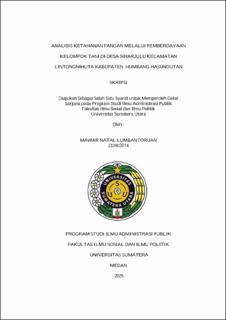| dc.description.abstract | Food security is a crucial issue in rural development, particularly in the
agricultural sector, which serves as the main livelihood for rural communities.
This study aims to analyze food security through the empowerment of farmer
groups in Siharjulu Village, Lintongnihuta District. The research focuses on food
security indicators, including food availability and accessibility, as well as direct
and indirect impacts as proposed by Maxwell and Frankenberger (1992).
This study uses a descriptive qualitative method with data collection
techniques such as interviews, observations, and documentation involving
informants including the village head, village officials, as well as the heads and
members of farmer groups. The results show that farmer groups have contributed
to improving the availability of agricultural facilities. However, challenges
persist, such as the absence of written regulations, weak coordination and
supervision mechanisms, delays in fertilizer distribution, and a lack of post
harvest storage facilities and nutrition education.
The findings reveal that the empowerment of farmer groups has had a
positive impact on food seurity, particularly in terms of the availability of
agricultural inputs such as tools, fertilizers, and seeds. However, food security
through farmer group empowerment has not been fully effective due to several
constraints, including the lack of formal regulations, weak oversight mechanisms,
and irregular fertilizer distribution. These issues affect agricultural productivity
and farmers’ income. Indirect impacts such as changes in farmers’ mindsets and
a growing spirit of self-reliance are starting to emerge, though not evenly.
Therefore, clear and systematic village regulations, institutional strengthening of
farmer groups, and improvements in the distribution mechanism for agricultural
assistance are necessary to support sustainable food security. | en_US |


